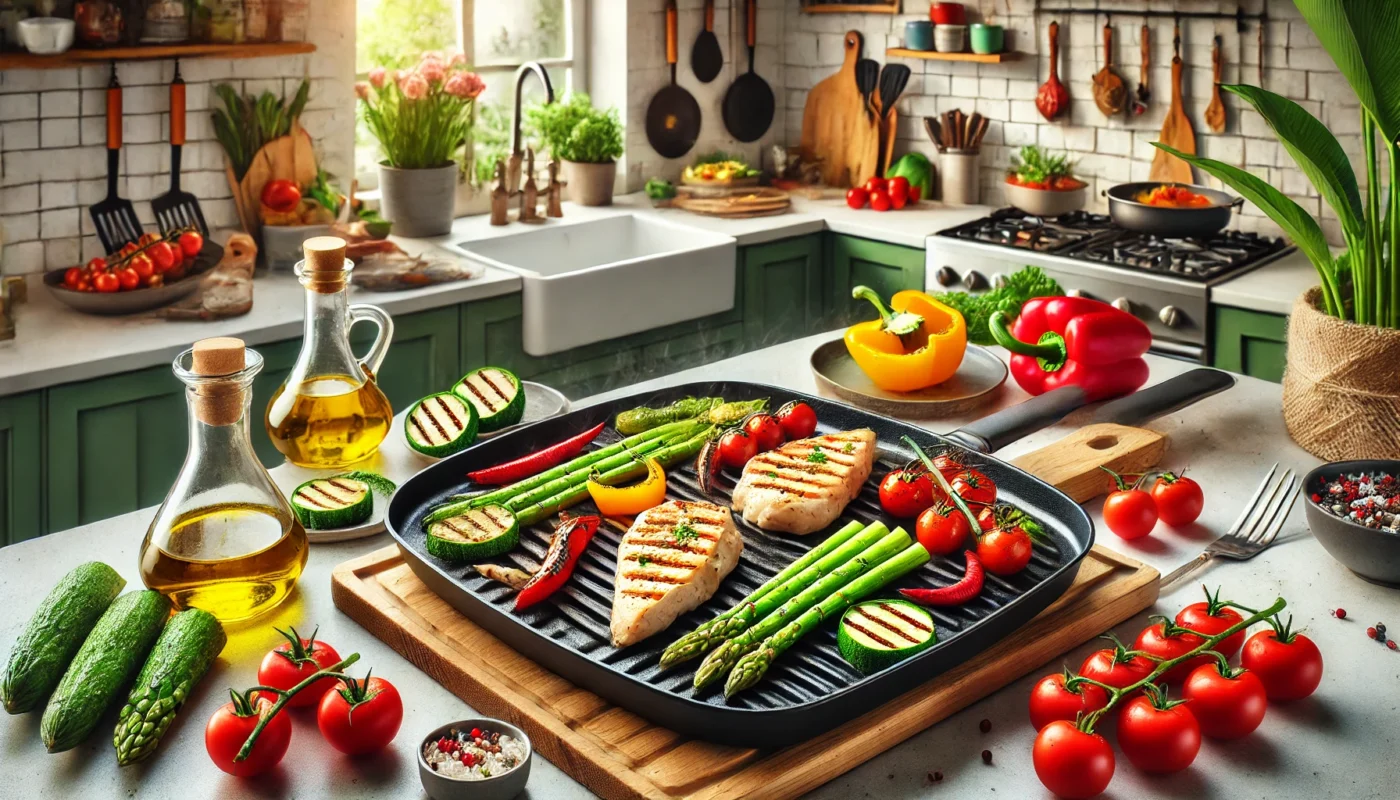Inflammation is a natural process and an essential component of our immune response. While acute inflammation is crucial for healing, chronic inflammation can pave the way for numerous health challenges, such as heart disease, diabetes, and autoimmune disorders. Surprisingly, our diet, particularly the consumption of grilled meat, might play a role in influencing inflammation. This article explores the intricate relationship between grilled meat and inflammation and offers practical advice for those aiming to optimize their health.
You May Also Like: Inflammatory Diseases: Causes and Treatments Explained
What Is Inflammation?
Inflammation is the body’s natural defense mechanism. When the body encounters harmful stimuli, such as pathogens, damaged cells, or irritants, it triggers an inflammatory response. This response involves the release of chemicals that alert the immune system, resulting in redness, swelling, heat, and sometimes pain.
The Role of Inflammation in Healing
Inflammation is a vital part of the body’s healing process. When tissues are injured or infected, inflammation helps to isolate the affected area, preventing the spread of harmful agents. The increased blood flow brings immune cells to the site of injury or infection, aiding in the repair of damaged tissues.
Chemical Messengers of Inflammation
Cytokines and chemokines are key chemical messengers involved in inflammation. They orchestrate the immune response by signaling immune cells to the site of injury. While beneficial in acute inflammation, their persistent presence in chronic inflammation can lead to tissue damage.
Inflammation and the Immune System
The immune system relies on inflammation to combat infections and facilitate healing. However, when inflammation becomes chronic, it can lead to immune system dysregulation. This prolonged inflammatory state can result in the immune system attacking healthy tissues, contributing to autoimmune diseases.
Acute vs. Chronic Inflammation
Acute inflammation is short-term and often beneficial, helping the body to heal and fend off harmful invaders. Chronic inflammation, on the other hand, is a prolonged response that can damage tissues and organs over time, potentially leading to chronic diseases.
The Mechanism of Acute Inflammation
Acute inflammation is characterized by its rapid onset and short duration. It typically resolves once the harmful stimuli are removed or the tissue is healed. This type of inflammation is marked by the classic signs of redness, heat, swelling, and pain, which are essential for the healing process.
Chronic Inflammation: A Silent Threat
Chronic inflammation persists for months or even years, often going unnoticed. It can result from unresolved acute inflammation, autoimmune disorders, or long-term exposure to irritants. Over time, it can cause lasting damage to tissues and organs, increasing the risk of various diseases.
Health Implications of Chronic Inflammation
Chronic inflammation is a significant contributor to the development of numerous diseases, including cardiovascular disease, type 2 diabetes, cancer, and neurodegenerative conditions. Understanding the factors that lead to chronic inflammation, such as diet and lifestyle, is crucial for prevention and management.

Grilled Meat and Inflammation: The Connection
The link between grilled meat and inflammation is primarily due to the formation of certain compounds during the grilling process. Two major culprits are heterocyclic amines (HCAs) and polycyclic aromatic hydrocarbons (PAHs).
The Chemistry Behind Grilling
Grilling meat at high temperatures results in chemical reactions that produce HCAs and PAHs. These compounds form when amino acids and sugars react with creatine found in muscle meats. The intense heat and direct flame are key factors in their formation.
Heterocyclic Amines (HCAs)
HCAs form when muscle meats, such as beef, pork, fish, or poultry, are cooked at high temperatures. Studies suggest that these compounds may contribute to inflammation and increase the risk of cancer.
Formation and Impact of HCAs
HCAs are created when amino acids and creatine in meat interact at high temperatures, especially during grilling. Research indicates that HCAs may promote inflammation by triggering oxidative stress, which can lead to cellular damage and an increased risk of chronic diseases.
Research Findings on HCAs
Numerous studies have linked high HCA intake to an elevated risk of cancers, such as colon, breast, and prostate cancer. Additionally, animal studies have shown that HCAs can induce inflammatory responses, highlighting the potential health risks of consuming grilled meats.
Mitigating HCA Exposure
Reducing HCA formation involves using cooking techniques that lower cooking temperatures and minimize cooking time. Techniques such as marinating meat, turning meat frequently, and avoiding direct contact with flames can significantly decrease HCA levels.
Polycyclic Aromatic Hydrocarbons (PAHs)
PAHs are formed when fat and juices from meat grilled directly over an open flame drip onto the fire, causing flames. These flames contain PAHs that can adhere to the surface of the meat. Similar to HCAs, PAHs have been linked to cancer and may play a role in promoting inflammation.
The Formation of PAHs
When fat drips onto open flames, it causes a flare-up, producing smoke that contains PAHs. These compounds then settle on the surface of the meat, increasing exposure when consumed. The higher the fat content, the greater the potential for PAH formation.
Health Risks Associated with PAHs
PAHs are not only associated with cancer risk but also contribute to oxidative stress and inflammation. Long-term exposure to PAHs is linked to cardiovascular diseases and other chronic inflammatory conditions, making it essential to manage intake from grilled foods.
Reducing PAH Risks
To minimize PAH formation, opt for lean cuts of meat and trim excess fat before grilling. Using indirect grilling methods, where the meat is not directly over the flame, and keeping the grill clean can also help reduce PAH exposure.
Is Grilled Meat Inflammatory?
The question “Is grilled meat inflammatory?” does not have a simple yes or no answer. While the compounds formed during grilling can contribute to inflammation, the overall impact on health depends on various factors, including frequency of consumption, portion sizes, and the presence of other anti-inflammatory foods in the diet.
Individual Dietary Patterns
The impact of grilled meat on inflammation varies among individuals, influenced by their overall dietary habits. A diet high in processed foods and low in fruits and vegetables can exacerbate the inflammatory effects of grilled meats.
Frequency and Portion Size
Regular consumption of large portions of grilled meats can increase exposure to HCAs and PAHs, heightening the risk of inflammation. Moderation and mindful portion control are key to balancing enjoyment and health.
Balancing Grilled Meat with Anti-inflammatory Foods
Incorporating a variety of anti-inflammatory foods, such as colorful fruits and vegetables, whole grains, and healthy fats, can mitigate the potential inflammatory effects of grilled meats. These foods provide antioxidants and phytochemicals that support the body’s defense against inflammation.

Practical Tips for Healthier Grilling
For those who enjoy grilled meat, there are several strategies to minimize the formation of HCAs and PAHs, thereby reducing the potential inflammatory impact.
Marinate Before Grilling
Marinating meat before grilling can significantly reduce HCA formation. Ingredients like lemon juice, vinegar, and herbs contain antioxidants that may block the formation of harmful compounds.
The Science Behind Marination
Marinating meat with acidic and antioxidant-rich ingredients can create a protective barrier, slowing down the formation of HCAs during grilling. Studies have shown that certain herbs and spices, such as rosemary and turmeric, are particularly effective in reducing harmful compound formation.
Recipes for Effective Marinades
Experiment with various marinades using ingredients like olive oil, garlic, ginger, and citrus juices. Not only do these marinades enhance flavor, but they also offer additional health benefits by reducing the risk of inflammation.
Timing and Techniques for Marinating
For optimal results, marinate meat for at least 30 minutes before grilling. Longer marination times enhance the flavor and protective effects against HCAs. Be sure to discard any leftover marinade that has been in contact with raw meat to avoid contamination.
Opt for Lean Cuts
Choosing lean cuts of meat reduces the amount of fat that drips onto the grill, thus decreasing PAH formation. Trim visible fat to further minimize risk.
Identifying Lean Meat Options
Select cuts like chicken breast, pork loin, or beef sirloin, which are lower in fat content. These cuts not only reduce PAH formation but also offer a healthier option for those conscious of their saturated fat intake.
Trimming Techniques for Reduced Fat
Before grilling, remove any visible fat and skin from the meat. This step not only reduces PAH formation but also contributes to a leaner, healthier meal option.
Benefits of Lean Protein Sources
Lean proteins are an essential part of a balanced diet, providing essential nutrients without excessive saturated fats. Incorporating lean meats can complement a health-conscious lifestyle and support efforts to reduce inflammation.
Avoid Overcooking
Overcooked or charred meat contains higher levels of HCAs and PAHs. Aim for medium-rare or medium doneness to minimize exposure to these compounds.
Understanding Cooking Temperatures
Cooking meat to the appropriate internal temperature ensures safety without excessive charring. Use a meat thermometer to monitor doneness and prevent overcooking, which can increase the formation of harmful compounds.
Techniques to Prevent Charring
Flip meat frequently and adjust grill settings to lower heat levels, reducing the risk of charring. Consider using foil or grilling mats to create a barrier between the meat and direct flames.
The Importance of Doneness
Achieving the right level of doneness is crucial for both flavor and health. Medium-rare to medium doneness not only enhances the taste and texture of meat but also minimizes the formation of HCAs and PAHs.
Include Antioxidant-rich Foods
Pair your grilled meats with plenty of vegetables and fruits. These foods are rich in antioxidants that combat inflammation and can help neutralize the effects of HCAs and PAHs.
The Power of Antioxidants
Antioxidants neutralize free radicals and reduce oxidative stress, combating inflammation. Foods like berries, leafy greens, and nuts are excellent sources of antioxidants that can counteract the effects of grilled meats.
Complementary Side Dishes
Create balanced meals by including colorful salads, roasted vegetables, or fruit salsas alongside grilled meats. These additions enhance flavor, provide essential nutrients, and support an anti-inflammatory diet.
Incorporating a Rainbow of Colors
Aim to include a variety of colors in your meals, as different pigments in fruits and vegetables offer distinct antioxidant properties. This diversity can enhance the overall health benefits of your diet.
Alternatives to Grilling
While grilling is a popular cooking method, there are healthier alternatives that can help reduce the risk of inflammation.
Baking and Broiling
Baking and broiling are excellent alternatives to grilling. They allow for the use of lower temperatures, reducing the formation of HCAs and PAHs.
Benefits of Baking
Baking uses indirect heat, preserving the nutrients in meat while minimizing harmful compound formation. This method is versatile and can be used for a variety of dishes, from meats to vegetables.
Broiling Techniques for Health
Broiling involves cooking meat with direct heat from above, similar to grilling but with less exposure to flames. Using broiling pans with drip trays can reduce fat accumulation and PAH formation.
Flavorful Oven-cooked Recipes
Experiment with oven-based recipes that incorporate herbs, spices, and marinades. These methods can enhance the natural flavors of meat while promoting a healthier cooking approach.
Steaming and Poaching
These methods involve cooking meat in water or broth, eliminating the risk of harmful compound formation altogether. They are ideal for retaining nutrients and moisture in the meat.
Steaming for Nutrient Retention
Steaming is a gentle cooking method that preserves the natural flavors and nutrients of meat. It is ideal for delicate proteins, such as fish, and can be paired with aromatic herbs for added taste.
Poaching as a Healthy Option
Poaching involves simmering meat in a flavorful liquid, such as broth or wine. This technique keeps the meat tender and moist while infusing it with subtle flavors, making it an excellent choice for health-conscious cooking.
Creative Steaming and Poaching Ideas
Explore a variety of recipes that incorporate steaming and poaching, such as Asian-inspired dishes with ginger and soy sauce or Mediterranean-style meals with herbs and lemon. These methods provide flavorful alternatives to traditional grilling.

Conclusion: Balancing Enjoyment and Health
The relationship between grilled meat and inflammation is complex, but with informed choices, you can enjoy grilled meats while minimizing potential health risks. Balance is key; by incorporating anti-inflammatory foods and employing healthier cooking methods, you can indulge in the flavors of grilled meat without compromising your health.
The Role of Moderation
Moderation is essential when it comes to enjoying grilled meats. Balancing indulgence with mindful eating habits ensures you can savor your favorite foods while maintaining a healthy lifestyle.
Embracing a Holistic Approach
Understanding the science behind inflammation and dietary choices empowers you to make informed decisions that support your overall well-being. As always, moderation is essential, and considering the bigger picture of your diet will help you maintain optimal health.
Empowering Healthy Lifestyle Choices
By adopting a comprehensive approach to health and wellness, you can enjoy the pleasures of grilled meat while keeping inflammation at bay. Remember, knowledge is power, and with the right strategies, you can enhance your diet and live a healthier life. Empower yourself to make dietary choices that support long-term health and vitality.
Further Reading:
Cleveland Clinic: 5 Types of Foods That Cause Inflammation
Medical News Today: BMI, not red meat may directly contribute to inflammation, study finds
National Library of Medicine: Advanced Glycation End Products in Foods and a Practical Guide to Their Reduction in the Diet
Lean proteins, balanced diet, inflammation, cooking temperatures, grilling techniques, antioxidants, healthy cooking methods, baking, broiling, steaming, poaching, anti-inflammatory diet, nutrient retention, healthy lifestyle, moderation, holistic health, meal planning, colorful meals, grilling alternatives, health-conscious cooking
Important Note: The information contained in this article is for general informational purposes only, and should not be construed as health or medical advice, nor is it intended to diagnose, prevent, treat, or cure any disease or health condition. Before embarking on any diet, fitness regimen, or program of nutritional supplementation, it is advisable to consult your healthcare professional in order to determine its safety and probable efficacy in terms of your individual state of health.
Regarding Nutritional Supplements Or Other Non-Prescription Health Products: If any nutritional supplements or other non-prescription health products are mentioned in the foregoing article, any claims or statements made about them have not been evaluated by the U.S. Food and Drug Administration, and such nutritional supplements or other health products are not intended to diagnose, treat, cure, or prevent any disease.

